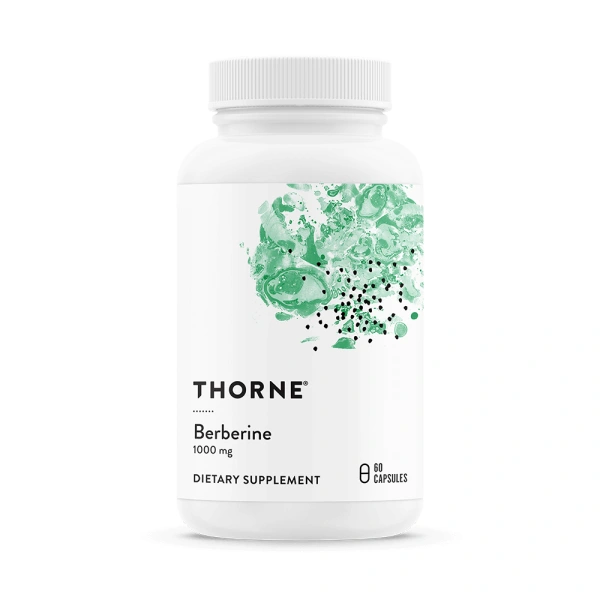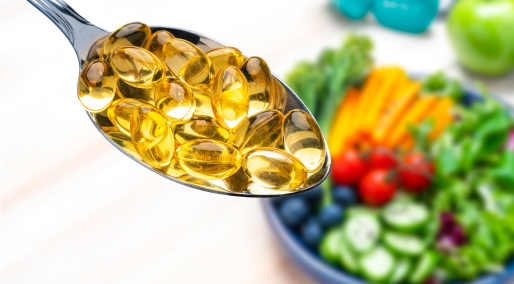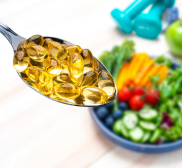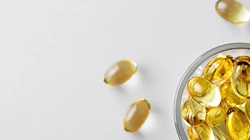s.webp)
s.webp)

Martyna Wiśniewska
Insulin resistance - what is it?
More and more often the patient hears the diagnosis — insulin resistance. He usually does not fully understand what this disease is, how it is treated and how much lifestyle influences its presence. Changing your lifestyle may lead to the complete reversal of the disease. Not every doctor classifies insulin resistance as adisease, but as an element of the so-calledmetabolic syndromewhich consists of many elements.
In short, insulin resistance is nothing else than low tissue sensitivity to insulin. It may be present despite apparently normal blood glucose levels. Insulin is hormone, responsible for regulating blood sugar levels.
Why is there currently so much emphasis on early diagnosis of insulin resistance? Due tocomplications that may result from untreated, disturbed insulin metabolism. This condition may lead to the development of type 2 diabetes. Unfortunately, this is not the only threat. In women, it may be uncontrolled weight gain or the development ofpolycystic ovarian disease, which may lead toinfertility.
REASONS
There are many of them, the biological one is insulin transportdisorder to liver cells , muscles and fat tissue. Very often, but not always, people with insulin resistance are characterized by a specific "flatulence". i.e. an increased amount offattissue around the waist. This condition is difficult to capture because insulin resistance is very difficult to diagnose.
The direct cause is in everyday life. Incorrect number of meals, too large and large portions, often skipping or even giving up breakfast. Too little fiber intake may also contribute to the development of insulin resistance.
The diet of the average person is rich in saturated fatty acids. Unaware of the fat content in processed products, we eat huge amounts of trans fats. The Polish diet is not the lightest. Traditional dishes are often fried, desserts after dinner are composed of simple sugars and saturated fatty acids, and weekends are filled with alcohol, which may be an additional risk factor in the development of insulin resistance.
The mechanism of insulin resistance is as follows. Due toimpaired insulin transportto the muscles, the pancreas tries to produce even more of it. Ultimately, the amount of insulin in the blood increases. We are then dealing with hyperinulinism. Which will result in constant body weight gain, which may consequently develop into obesity. Insulinis responsible for growth and weight gain, and also improves appetite. Therefore, such a person will not only gain weight by eating the same portions as before, but also his/her appetite will increase, which will make it much more difficult to maintain a caloric deficit. However, at some point we reach a wall and the pancreas's capabilities end. Then type 2 diabetes may occur
In addition to type 2 diabetes, the effects of insulin resistance will include hypertension, which may be more common occur in people with this disease. Disorders related to cholesterol level, which may lead to atherosclerosis. The result of the constantly increasing amount of cholesterol in the liver may be problems related to its functioning, which in the long run may lead to non-alcoholic fatty liver disease. Patients also suffer from gout more often due to increasing amounts of uric acid. Increasing body weight may cause sleep problems and related breathing disorders.
Insulin resistance often affects young women trying to conceive. During routine tests, metabolic syndrome is diagnosed, and with it insulin resistance. The ovary is directly exposed to excess insulin, and then produces large amounts of androgens, which can lead to menstrual disorders, stopping ovulation and causing excess body hair and acne. Women using hormonal contraception may be more susceptible to insulin resistance and impaired glucose tolerance. Birth control pills themselves cause increased insulin secretion. They may also complicate treatment.
DIAGNOSIS
We already know how insulin resistance occurs, now we will talk about how it can be diagnosed. It's best to control your waist circumference. Too much fat tissue in this place may be an alarm signal for us. This is not a clear diagnosis, but it may draw our attention to starting laboratory diagnostics for insulin resistance and lipid disorders.
The next stage will be blood glucose control using a glucometer. This is a non-invasive method, available from your primary care physician. Personal glucometers, which more and more people have at home, will enable us to constantly monitor them.
Laboratory tests are the final diagnosis that can be made by a doctor. They include not only the measurement of fasting glucose and insulin levels, but also the so-called insulin curves and glucose curves. The test can be performed at the request of a doctor or dietitian and is called an oral glucose tolerance test (OGGT).
Only after full diagnostics can it be determined whether the patient is sick, whether he requires pharmacotherapy, or whether his In this case, a lifestyle change is enough.
HOW DO WE TREAT INSULIN RESISTANCE?
The best solution is diet therapy based on complex carbohydrates andphysical activity . The key to success in treating this disease is often physical activity. If we reduce body weight, the level of body fat will also decrease, making the treatment more effective. Any exercise, except short-term, low-intensity exercise, will lead to a reduction in insulin levels in the blood. The most important thing is to gradually extend the exercise time, thanks to which we will achieve better results in the treatment process. In some cases, it is necessary to initiate pharmacotherapy.
The next element of treatment is diet. Information about what diet will be effective is flooding the Internet. However, you should not trust every fashion. Portals that provide recommendations on restrictive diets or fasting on their home page may be considered unreliable information. The most effective general advice will be to follow a diet composed of low glycemic index foods. We try to include more unsaturated fatty acids in the diet of a person with insulin resistance and fewer products containing trans fats. We completely eliminate processed products. We do everything to ensure a varied diet, ensuring an adequate supply of fiber. Let's include more raw vegetables, but also boiled, stewed, baked, soups and purees. Let us remember that fruit is a source of health, but we should be careful with its quantity. It is recommended that people suffering from insulin secretion disorders consume about 1-2 portions of fresh fruit with a low glycemic index. It is also worth making friends with fish and vegetable oils, rich in omega 3 acids, which have anti-inflammatory properties and scavenge free radicals.
When changing our diet, we often fall into the trap of ignorance and make basic mistakes. One of them may be the inclusion of fruit juices, which have a high caloric value, are a source of a large amount of sugar and have a high glycemic index. Excessive use of salt is also inadvisable, but it is common in Polish cuisine. Let's forget about adding salt.
Insulin resistance, although not always classified as a disease, is a state of significant weakening of the body, so it is good to take care of it for adequate regeneration. Let us take into account that in order to achieve the desired effect of regulating the hormonal balance, it is necessary to reduce the stress level. By using, among other things, relaxation techniques or attending relaxation classes regularly.
Sleep is another essential element in our health puzzle. Even though some people believe that they can get enough sleep after 5 or 6 hours of sleep, this is a false impression. Proper rest and regeneration for our body brings good quality sleep - at least 7 hours. However, everyone has their own cut-off point, no less than 7 hours. Some people need 9 hours to regenerate and this is also possible. If our body calls for sleep, we should postpone all duties in favor of sleep. Only then can we ensure a proper healing process.
The most frequently used drug for insulin resistance is metformin.It increases the impression tissues' ability to respond to insulin, thanks to which glucose is captured by the tissues and does not accumulate as fat tissue. This makes it possible to reduce body fat and lose weight faster.
To sum up, insunlin resistance is a disorder that affects our entire body, has a destructive and pathogenic effect. You should take care of a healthy lifestyle. People struggling with insulin resistance should, first of all, take care of an appropriate diet and focus on physical activity. They should also make sure they get plenty of rest and undergo regular examinations. Thanks to this, we can be sure that we control our health and the treatment we introduce will be effective.
RECOMMENDED PRODUCTS
Beta glucan – a substance naturally occurring in the cell walls of many plants, fungi and microorganisms. The most active form is beta glucan 1.3/1.6 D, which occurs, among others, in the yeast cell wall. The patented, advanced extraction technology guarantees its high purity and, consequently, high effectiveness.
SWANSON Alpha Lipoic Acid (R-Alpha Lipoic Acid) - Double Strength - 100mg - 60 caps

For a more effective alpha lipoic acid supplement, try Swanson R-Fraction Alpha Lipoic Acid. Conventional alpha lipoic acid supplements contain a racemic mixture of 50-50 R and S isomers, but the R isomer is the only form found in the human body and is the form responsible for most of the beneficial effects of alpha lipoic acid.
THORNE Berberine-500 (Berberine) 60 vegetarian capsules

Berberine is an alkaloid found in many plants, including Hydrastis canadensis (Canadian goldenseal), Coptis chinensis (Vermine), Berberis aquifolium, Berberis vulgaris (Common barberry), and Berberis aristata (Indian barberry). The berberine in Berberine-500 comes from the Indian barberry (root) extract (Berberis aristata). Thorne's high-quality berberine products provide a broad spectrum of immunological activity and support for the digestive tract.
GARDEN OF LIFE Dr. Formulated Probiotics Once Daily (Probiotic) - 30 vegetarian capsules

David Perlmutter, M.D., is an expert in the human microbiome, board-certified neurologist, Fellow of the American College of Nutrition, America's Brain Health Expert, and #1 New York Times bestselling author. Dr. Formulated Probiotics Once Daily is a unique, powerful probiotic specifically designed to support a healthy microbiome. Dr. Perlmutter created this unique formula with 30 billion CFU of beneficial probiotics made from a variety of raw probiotic strains that are resistant to stomach acid and bile for daily support digestive system and immune system.
Rate the text

Martyna Wiśniewska
As a dietitian, he helps in clinical diet therapy, helping not only to lose weight, but also to feel better in his body. In the office he sees patients whom he helps in: treatment of diet-dependent diseases such as diabetes, insulin resistance, hypertension, obesity, atherosclerosis, treatment of allergies and food intolerances, dietotherapy of diseases such as celiac disease, Hashimoto's disease, Crohn's disease, rheumatoid arthritis, thyroid disease. Patients who suffer from eating disorders, depression, sleep problems, chronic stress or simply would like to have more strength in life can count on professional help.
As a dietitian, he helps in clinical diet therapy, helping not only to lose weight, but also to feel better in his body. In the office he sees patients whom he helps in: treatment of diet-dependent diseases such as diabetes, insulin resistance, hypertension, obesity, atherosclerosis, treatment of allergies and food intolerances, dietotherapy of diseases such as celiac disease, Hashimoto's disease, Crohn's disease, rheumatoid arthritis, thyroid disease. Patients who suffer from eating disorders, depression, sleep problems, chronic stress or simply would like to have more strength in life can count on professional help.


























